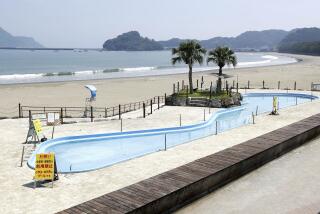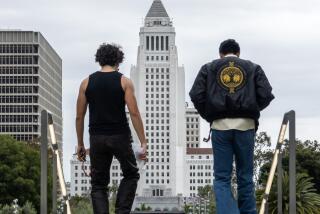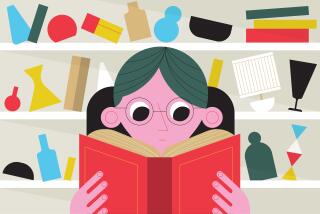Psychological aftershocks rattle Japanese
- Share via
Reporting from Tokyo — A few days after Japan’s magnitude 9 earthquake struck, physician Munetaka Ushio was making his rounds visiting patients when he felt the unnerving sensation of the earth moving beneath his feet.
Dizzy and unsettled, he fell into a chair and waited out what he thought was another of the hundreds of aftershocks that have rocked Japan since the disastrous March 11 earthquake and accompanying tsunami.
“I felt something was shaking. I didn’t know whether it was an aftershock or if my mind was playing tricks on me,” said the 38-year-old ear, nose and throat specialist at Tokyo Medical Center.
What happened next really shook him, Ushio says. When nobody else in the room said they had felt any tremors, Ushio checked an earthquake-monitoring website to confirm his suspicion: It was all in his head.
Ushio had experienced a mysterious condition known here as jishin-yoi, or “earthquake drunk,” an illness in which people feel as if they are swaying, as though moved by a phantom temblor.
Medical experts aren’t sure whether the phenomenon stems from a brain-inner ear disconnect or a psychosomatic form of earthquake phobia that causes sufferers to become hyper-alert, awaiting the next unsettling moment. Clinics across quake-stricken northeastern Japan have seen an increase in patients seeking treatment for symptoms that often include falling down, fevers and vomiting.
Mental health experts liken the illness to what is known as “disembarkment syndrome,” an unsettling feeling of movement that strikes sea passengers long after they have stepped off a ship. It’s among several challenges people are encountering post-quake, adding to public health officials’ concern that a sense of hopelessness for some Japanese might lead to an increase in suicides.
The false sensation of movement, which triggers panic attacks, was reported after recent earthquakes in Chile and New Zealand. Researchers say such psychological aftershock affects as many as 50% of people near the epicenter of a major earthquake.
Across northeastern Japan, where more than 20,000 people were killed in the March earthquake and tsunami, residents have not yet regained their trust in the earth beneath them. There have been too many aftershocks.
Jun Yanagisawa, a city worker in Fukushima prefecture, was meeting with local business owners recently when he felt an aftershock rattling the building. He froze and watched others around the table. Nobody moved.
“That was the biggest one in a while,” Yanagisawa said later. “Just after the big quake, we had several aftershocks a day. These days we have a moderate aftershock every two or three days.”
Often, said Yanagisawa, he’s not sure whether it’s the ground or his own nerves that have been shaken. “I often feel the ground is shaking even when other people say it’s not,” he said. “It might be a truck passing outside or an actual quake.
“I’ve become very sensitive to even the smallest vibrations,” he added. “It’s hard to tell whether it’s real or imagined. It could be fatigue. Mentioning the aftershocks in a conversation is now like chatting about the weather. It’s just part of what we talk about now. It didn’t use to be like that.”
Ushio first heard about the illness after the Kobe earthquake in 1995. He said he’s treated more than two dozen patients suffering from the symptoms in the last few months.
His own recent experience led Ushio to ask other physicians whether they too had occasionally suffered the effects. “Many just wrote it off to the dread and anticipation of another earthquake,” he said.
Though Ushio has prescribed anti-anxiety medication and antidepressants to patients for the most serious cases, assuring them that medical help is available, he decided to document his own symptoms without drugs. For weeks, as his illness lingered, he took notes of its seriousness and frequency of episodes.
“I know it’s not a life-threatening condition. It fascinated me. So I became my own test animal,” he said. “With this illness, I’m both physician and patient. I think it’s made me a better doctor.”
Special correspondent Kenji Hall contributed to this report.
More to Read
Sign up for Essential California
The most important California stories and recommendations in your inbox every morning.
You may occasionally receive promotional content from the Los Angeles Times.











